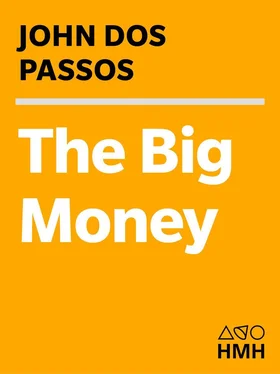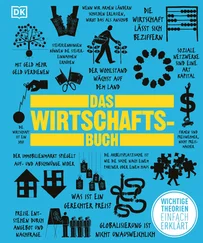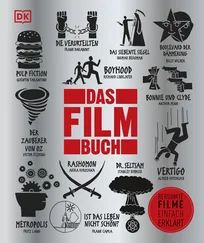Charley felt good standing on the stoop in the spring evening. The city air had a cool rinsed smell after the rain. He was wondering if she… Well, you never can tell till you try. Al Johnson came out behind him and took his arm. “Say, Paul says you come from out home.”
“Sure,” said Charley. “Don’t you see the hayseed in my ears?”
“Gosh, when Eveline has two or more of her old beaux calling on her at once it’s a bit heavy… And she like to froze that poor little girl of Don’s to death… Say, how about you and me go have a drink of whiskey to take the taste of that damn red ink out of our mouths?”
“That’ud be great,” said Charley.
They walked across Fifth Avenue and down the street until they got to a narrow black door. Al Johnson rang the bell and a man in shirtsleeves let them into a passage that smelt of toilets. They walked through that into a barroom. “Well, that’s more like it,” said Al Johnson. “After all I only have one night off a week.”
“It’s like the good old days that never were,” said Charley.
They sat down at a small round table opposite the bar and ordered rye. Al Johnson suddenly waved his long forefinger across the table. “I remember when it was I met you. It was the day war was declared. We were all drunk as coots down at Little Hungary.” Charley said jeez, he’d met a lot of people that night. “Sure that’s when it was,” said Al Johnson. “I never forget a face,” and he called to the waiter to make it beer chasers.
They had several more ryes with beer chasers on the strength of old times. “Why, New York’s like any other dump,” Charley was saying, “it’s just a village.” “Greenwich Village,” said Al Johnson.
They had a flock of whiskeys on the strength of the good old times they’d had at Little Hungary. They didn’t like it at the table any more so they stood up at the bar. There were two pallid young men at the bar and a plump girl with stringy hair in a Bulgarian embroidered blouse. They were old friends of Al Johnson’s. “An old newspaperman,” Al Johnson was saying, “never forgets faces… or names.” He turned to Charley. “Colonel, meet my very dear friends… Colonel… er…” Charley had put out his hand and was just about to say Anderson when Al Johnson came out with “Charles Edward Holden, meet my artistical friends…”
Charley never got a chance to put a word in. The two young men started to explain the play they’d been to at the Washington Square Players. The girl had a turnedup nose and blue eyes with dark rings under them. The eyes looked up at him effusively while she shook his hand. “Not really… Oh, I’ve so wanted to meet you, Mr. Holden. I read all your articles.” “But I’m not really…” started Charley. “Not really a colonel,” said the girl. “Just a colonel for a night,” said Al with a wave of his hand and ordered some more whiskies.
“Oh, Mr. Holden,” said the girl, who put her whiskey away like a trooper, “isn’t it wonderful that we should meet like this?… I thought you were much older and not so good-looking. Now, Mr. Holden, I want you to tell me all about everything.”
“Better call me Charley.”
“My name’s Bobbie… you call me Bobbie, won’t you?” “Check,” said Charley. She drew him away down the bar a little. “I was having a rotten time… They are dear boys, but they won’t talk about anything except how Philip drank iodine because Edward didn’t love him any more. I hate personalities, don’t you? I like to talk, don’t you? Oh, I hate people who don’t do things. I mean books and world conditions and things like that, don’t you?” “Sure,” said Charley.
They found themselves at the end of the bar. Al Johnson seemed to have found a number of other very dear friends to celebrate old times with. The girl plucked at Charley’s sleeve: “Suppose we go somewhere quiet and talk. I can’t hear myself think in here.” “Do you know someplace we can dance?” asked Charley. The girl nodded.
On the street she took his arm. The wind had gone into the north, cold and gusty. “Let’s skip,” said the girl, “or are you too dignified, Mr. Holden?” “Better call me Charley.” They walked east and down a street full of tenements and crowded little Italian stores. The girl rang at a basement door. While they were waiting she put her hand on his arm. “I got some money… let this be my party.” “But I wouldn’t like that.” “All right, we’ll make it fifty-fifty. I believe in sexual equality, don’t you?” Charley leaned over and kissed her. “Oh, this is a wonderful evening for me… You are the nicest celebrity I ever met… Most of them are pretty stuffy, don’t you think so? No joie de vivre.” “But,” stammered Charley, “I’m not…”
As he spoke the door opened. “Hello, Jimmy,” said the girl to a slicklooking young man in a brown suit who opened the door. “Meet the boyfriend… Mr. Grady… Mr. Holden.” The young man’s eyes flashed. “Not Charles Edward…” The girl nodded her head excitedly so that a big lock of her hair flopped over one eye. “Well, sir, I’m very happy to meet you… I’m a constant reader, sir.”
Bowing and blushing Jimmy found them a table next to the dancefloor in the stuffy little cabaret hot from the spotlights and the cigarettesmoke and the crowded dancers. They ordered more whiskey and welshrabbits. Then she grabbed Charley’s hand and pulled him to his feet. They danced. The girl rubbed close to him till he could feel her little round breasts through the Bulgarian blouse.
“My… the boy can dance,” she whispered. “Let’s forget everything, who we are, the day of the week…”
“Me… I forgot two hours ago,” said Charley, giving her a squeeze.
“You’re just a plain farmerlad and I’m a barefoot girl.”
“More truth than poetry to that,” said Charley through his teeth.
“Poetry… I love poetry, don’t you?”
They danced until the place closed up. They were staggering when they got out on the black empty streets. They stumbled past garbagepails. Cats ran out from under their feet. They stopped and talked about free love with a cop. At every corner they stopped and kissed. As she was looking for her latchkey in her purse she said thoughtfully: “People who really do things make the most beautiful lovers, don’t you think so?”
Charley woke up first. Sunlight was streaming in through an uncurtained window. The girl was asleep, her face pressed into the pillow. Her mouth was open and she looked considerably older than she had the night before. Her skin was pasty and green and she had stringy hair.
Charley put his clothes on quietly. On a big table inches deep in dust and littered with drawings of funnylooking nudes, he found a piece of charcoal. On the back of a sheet of yellow paper that had a half a poem written on it he wrote: Had a swell time… Goodby… Goodluck. Charley. He didn’t put his shoes on until he got to the bottom of the creaky stairs.
Out on the street in the cold blowy spring morning he felt wonderful. He kept bursting out laughing. A great little old town. He went into a lunchroom at the corner of Eighth Street and ordered himself a breakfast of scrambled eggs and bacon and hotcakes and coffee. He kept giggling as he ate it. Then he went uptown to Fortysecond Street on the el. Grimy roofs, plateglass windows, grimy bulbs of electriclight signs, fireescapes, watertanks all looked wonderful in the gusty sunlight.
At the Grand Central Station the clock said eleventhirty. Porters were calling the names of westbound trains. He got his bag from the checkroom and took a taxi to the Chatterton House. That was where Joe Askew had written he ought to stay, a better address than the Y. His suitcase cut into his hand as it was heavy from blueprints and books on mechanical drawing, so he jumped into a taxi. When the clerk at the desk asked for a reference he brought out his reserve commission.
Читать дальше












